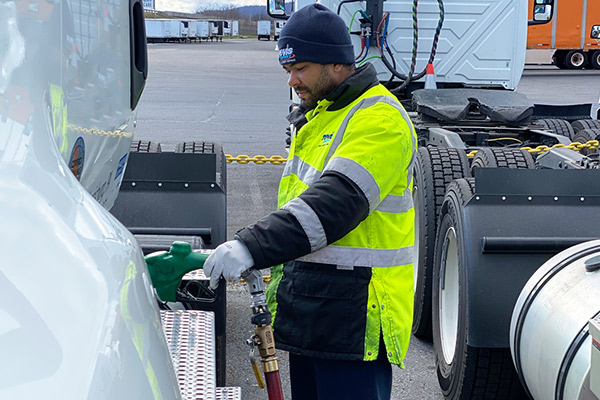Fleet transport comes with many challenges. However, one of the most unpredictable factors for planning is the price of fuel for commercial companies. This means your fleet managers are always on the lookout for ways to save money on fleet fuel expenses, such as changing policies and procedures or monitoring daily usage on each route. In this article, we share seven tips to help you reduce your fleet fuel costs.
7 Ways To Reduce Fleet Fuel Expenses
Following are some practical ways to reduce fleet fuel prices:
1. Fuel Your Fleet On-Site With Tevis Energy

On-site fuel delivery, or fleet fuel delivery, means efficiency and cost-effectiveness. Let Tevis Energy bring the diesel fuel or gasoline to you. You won’t have to worry about drivers spending time fueling their trucks, vans, or buses. Why pay a driver wage for them to pump gas? You’ll no longer have to negotiate prices with various companies to honor at their stations.
Work with Tevis to decide what type of fuel is needed, how much, and where to deliver it. Those decisions are yours alone. Then, you can work out a fair price, perhaps taking advantage of bulk and wholesale fuel options. The key features of this service are affordability, reliability, and safety. Be sure to give us a call today to find out more about what we can do for you!
2. Discourage Aggressive Driving
Train and monitor drivers to discourage aggressive driving. Being the fastest truck on the road does not translate into fuel efficiency. Encourage and even provide incentives for drivers who understand and take pride in smooth acceleration, shifting, and braking. Help them understand how traffic flow and the placement of stop signs and traffic lights affect fuel usage.
For example, there are studies that show a 20 percent improvement in fuel performance after driver training programs are implemented. This is an investment in drivers that definitely pays dividends to the bottom line.
3. Choose the Most Efficient Routes

Be careful about over-reliance on mapping software. The shortest route is not always the most fuel-efficient. The miles per gallon (MPG) ratio on your vehicles is impacted by traffic volume, time of day, construction, speed limits, and even the road configuration.
Effective fleet managers do well to actually monitor and analyze routes regularly, particularly those that are scheduled routinely as conditions do change. Even if the actual route cannot be moved, other factors may be adapted to increase fuel efficiency. Software that monitors fuel usage is helpful in making routing decisions.
4. Properly Maintain Your Fleet Vehicles

Fleet vehicle maintenance is an essential part of controlling fuel costs. If all parts of the vehicles are not functioning in optimum condition, the MPG starts to slip, and the costs start rising. It’s really quite simple. Start by following the manufacturer’s recommendations for everything from tire pressure to oil changes and replacing air filters. Also, it is important for drivers to report any engine problems as soon as they see or hear them, not to wait until the truck is sputtering along or stopped in the middle of nowhere.
The easiest check to do daily is tire pressure, especially on days of extreme temperature. Even the federal government promotes monitoring tire pressure to reduce fuel costs. The US Department of Energy refers to studies that show gas mileage can be improved from 0.6% to 3% simply by maintaining the recommended pressure for the tires. This effort is cost-effective for gas usage, and properly inflated tires last longer, which is another saving.
5. Communicate Effectively
It might not be obvious but effective communication can be a factor in the cost of fuel. For example, fuel is wasted when drivers run into unexpected traffic situations or drive empty when a pickup could have been arranged. This means using technology that allows drivers to communicate easily with each other and with your fleet managers.
Cell phones are the easiest devices to distribute, even if they have only voice and text functions. At least everyone can stay in touch and easily pass along essential information. Fleet management systems can be used for vehicle maintenance, vehicle tracking, and diagnostics, managing fuel, and monitoring driver behavior. There are many excellent, affordable software packages available. Determine what information you want to communicate and to whom before making a purchasing decision.
6. Pay Attention to Traffic

Traffic volume and flow are significant factors affecting fuel expenses. No one likes to be stuck in heavy, slow-moving traffic on a major thoroughfare where there is no easy exit. Put in place a communication system for your drivers to know exactly where to avoid and what optional routes are available. This might mean informal phone or radio calls to each other or from the fleet supervisor, or you might install a GPS system that alerts everyone to trouble ahead of time to go elsewhere.
7. Stop Unnecessarily Idling Your Vehicle
Idling trucks could be a budget line item on its own. Although it is sometimes necessary to idle, such as warming up the engine or waiting in a line-up that is moving slowly, there are times when it costs less to shut down after just 30 seconds and start up again. Much of this depends on the size and type of vehicle, the kind of situation it is sitting in, and even the weather.
There are telematic devices that can provide data on idling to help a fleet manager develop guidelines for drivers. Also, many municipalities have implemented anti-idling bylaws that can become part of a new company policy. Trucking can be a vital part of this green solution to pollution while saving money on fuel. The main directive is not to idle your vehicle unnecessarily.
Conclusion
If your drivers are given the training and tools mentioned above, they will be well-equipped to help you save on your fleet fuel expenses. If management commits to upgrading operations from arranging for safe, reliable on-site fueling to installing technology for monitoring and communication, there will be significant results when you review the cost of fuel, whether diesel, propane, gasoline, an on-site storage tank, or another fuel source, for your fleet. Contacting Tevis Energy for all your on-site commercial fuel needs is a good first step.
Contact Tevis Energy For Your Fuel Delivery Needs

Tevis Energy is a trustworthy HVAC company and fuel delivery company that services central Maryland and southern Pennsylvania. Our company offers affordable and the most competitive fuel prices in the area. Our goal is to provide you with excellent products and services. When you choose us to be your fleet fuel delivery supplier, you can rest easy knowing that you will have correct and prompt deliveries at the best possible prices. Furthermore, we offer various delivery plans and financing options, so you can customize your deliveries to meet your needs. Be sure to call us today to learn more.
Tevis Energy has certified and highly trained HVAC technicians to cater to all your heating and cooling needs. We guarantee that each of our techs has the experience, skills, and knowledge to provide excellent HVAC services. Our team can assist you with installations, repairs, maintenance, and much more. Our superior HVAC solutions always come at affordable costs. Click the link to view our service area.
Call us today to learn more about the products and services our company offers. We provide free, in-home estimates.
You can click here to contact us now or call us at (410) 876-6800 to find out more!
